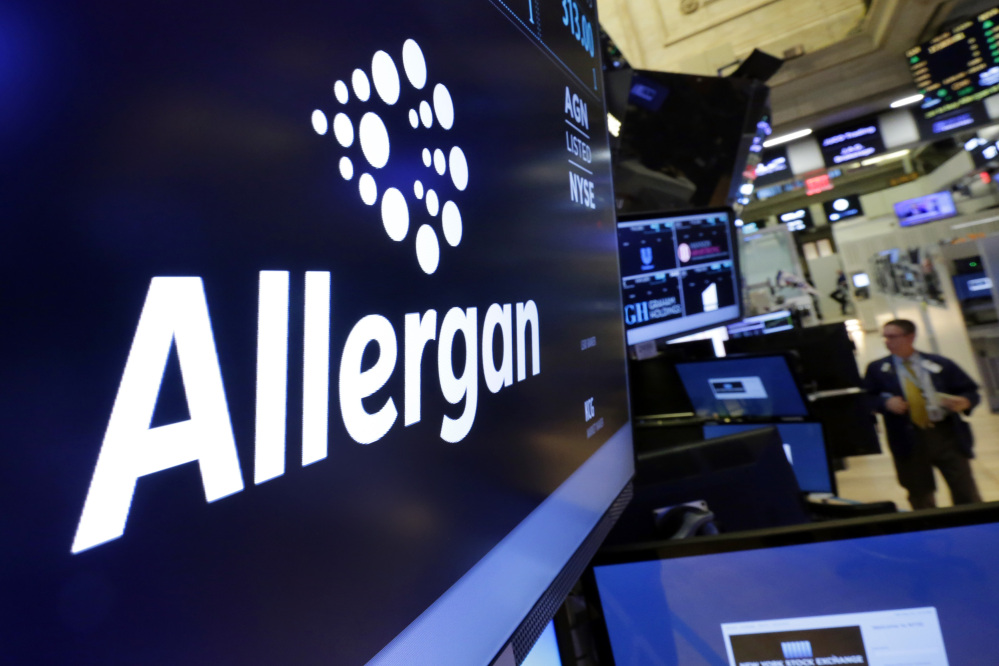Pfizer and Allergan on Monday announced they will merge in a $160 billion deal that will create the world’s largest drugmaker, producing treatments as varied as Lipitor and Botox.
The deal is structured as a reverse-merger, with smaller Dublin-based Allergan buying U.S.-based Pfizer, and it is likely to renew concerns over “inversions,” where U.S. companies are bought by or merge with foreign firms in order to reduce U.S. corporate tax burdens. In a news release, Pfizer said the combined company would generate more than $2 billion in savings over the first three years and would enjoy a tax rate of 17 to 18 percent – far less than Pfizer’s current corporate tax rate of 25 percent.
Just days ago, the U.S. Treasury Department issued rules seeking to crack down on these types of deals, which President Obama has labeled “unpatriotic.”
Last year, several such inversion deals fell apart and sparked scrutiny of corporate tax loopholes. In October 2014, Chicago-based AbbVie and Dublin-based Shire Pharmaceuticals called off a $54 billion inversion deal after the Treasury issued new rules. Raleigh, N.C.-based Salix Pharmaceuticals called off a reverse merger with the Italian firm Cosmo Pharmaceuticals SpA, citing changes in the political environment.
In a call with analysts, Pfizer chief executive Ian Read said that Pfizer appreciates the attention to inversions from politicians, presidential candidates and Treasury but decided to proceed.
“On the political risk, we’ve assessed this deal looking at the present regulations, the new notices, and all the information we can glean, and we believe this deal is a great deal for shareholders, both of Allergan and Pfizer,” Read said.
As measured by annual revenue, Pfizer is more than twice the size of Allergan – Pfizer reported $49.6 billion in revenues in 2014, while Allergan, which recently merged with Actavis, projected a combined $23 billion in revenues for 2015. The deal is expected to close in the second half of 2016 and create a combined company with an operating cash flow of more than $25 billion by 2018. Current Allergan shareholders will own 44 percent of the combined company, while Pfizer shareholders will own 56 percent.
Gustav Ando, research director for IHS Life Sciences, a business information and consulting company, said he thought the deal was carefully structured and likely to be approved, but added that it may receive even more scrutiny because of the current public and political outrage over high drug prices for the pharmaceutical industry.
“This merger isn’t meant to benefit patients; it isn’t meant to innovate in any kind of way. It’s basically a tax inversion strategy, and certainly the benefits won’t be passed on to consumers,” Ando said. “It’s pretty easy at the moment to paint the pharmaceutical industry in a negative light and this certainly doesn’t do anything to help the cause. It definitely increases the reputational risks to the industry.”
The combined company, which will be called Pfizer plc, will bring together a huge U.S. pharmaceutical company best known for iconic drugs like the cholesterol-fighting Lipitor and erectile dysfunction medication Viagra with Allergan, which is best known for making wrinkle-smoothing Botox.
Allergan will buy Pfizer, then Allergan plc will rename itself Pfizer plc, and the company will maintain its global headquarters in New York, but its key executive offices will be in Ireland, the statement said.
“Through this combination, Pfizer will have greater financial flexibility that will facilitate our continued discovery and development of new innovative medicines for patients, direct return of capital to shareholders, and continued investment in the United States, while also enabling our pursuit of business development opportunities on a more competitive footing within our industry,” Read said.
“Joining forces with Pfizer matches our leading products in seven high growth therapeutic areas and our robust R&D pipeline with Pfizer’s leading innovative and established businesses, vast global footprint and strength in discovery and development research to create a new biopharma leader,” Allergan chief executive Brent Saunders said.
Copy the Story LinkSend questions/comments to the editors.



Success. Please wait for the page to reload. If the page does not reload within 5 seconds, please refresh the page.
Enter your email and password to access comments.
Hi, to comment on stories you must . This profile is in addition to your subscription and website login.
Already have a commenting profile? .
Invalid username/password.
Please check your email to confirm and complete your registration.
Only subscribers are eligible to post comments. Please subscribe or login first for digital access. Here’s why.
Use the form below to reset your password. When you've submitted your account email, we will send an email with a reset code.